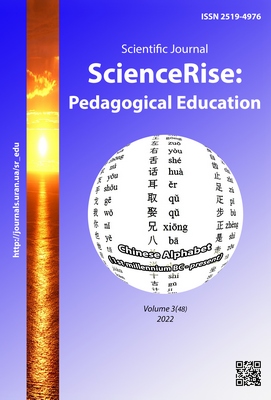Peculiarities of implementation of lifelong learning policy in Turkey
DOI:
https://doi.org/10.15587/2519-4984.2022.257601Keywords:
lifelong learning, continuing education, adult education, educational policy, TurkeyAbstract
The relevance of the study is due to the fact that in the 21st century, lifelong learning is recognized as one of the key pillars of education, closely intertwined with human development and financial growth. It is determined, that in recent years, major universities, governments and non-governmental organizations around the world continue to discuss the practice of lifelong learning. Being in the process of full membership in the EU, Turkey continues to comply with international norms and standards and comply with the established requirements.
The institutional efforts to support and disseminate adult education in Turkey, strengthen the vocational education and training system in the context of the implementation of the concept of lifelong learning were analized. It has been found, that in Turkey, the concept of lifelong has recently been seen as a model of approach to education and training. Turkey has been shown to need a long-term vision and strategy for adult learning as part of a broader lifelong learning strategy in order to increase adult learning opportunities.
The generalization of Turkey's progressive experience revealed the peculiarities of the implementation of lifelong learning policies, namely: ensuring the unity of national culture; implementing a strong policy of justice and equality in education; promotion of civic education; active participation in lifelong learning systems in order to build a competitive knowledge economy for the EU; promoting the literacy skills of Turkish citizens; training of qualified people in need of society; adaptation of non-formal and adult education to lifelong learning.
The generalization of vectors for expanding opportunities for adult learning in Turkey has identified promising areas for adult education in Ukraine, namely: investing in the expansion and diversification of learning spaces or opportunities in the field of lifelong learning; updating programs to support parents of young, children and adolescents; organization of trainings on raising awareness and skills of multi-literacy; recognition of certificates in the process of lifelong learning and non-formal education; conducting research on social consciousness for lifelong learning processes; supporting the development of a long-term adult learning strategy; expanding opportunities for adult learning, etc
References
- Köksal, O., Yildirim, T., Özdemir, O. (2013). The Reflection of the Educational Policies of the European Union to Turkish Education System in Terms of Turkey-Eu Integration. Middle-East Journal of Scientific Research, 18 (6), 803–809. Available at: https://www.idosi.org/mejsr/mejsr18(6)13/10.pdf
- Lifelong Learning Strategy Paper. Ministry Of National Education. Ankara-Turkey. Available at: http://www.ikg.gov.tr/wp-content/uploads/pdf/LLL_Strategy_Paper_Turkey_2009_July.pdf
- Dilbaz, E. (2021). Rethinking Adult Education In Turkey: The Proposal Of AEP Model. European Journal of Alternative Education Studies, 6 (12), 116–150. doi: http://doi.org/10.46827/ejae.v6i2.3954
- Kayman, E. A., Ilbars, Z., Artuner, G. (2012). Adult Education in Turkey: In Terms of Lifelong Learning. Procedia – Social and Behavioral Sciences, 46, 5858–5861. doi: http://doi.org/10.1016/j.sbspro.2012.06.528
- Öngör, S. (2014). Lifelong Learning Strategies In Turkey/Izmir: The Purpose of Learning and Barriers to Women’s Participation. Institute of International Education, 116. Available at: https://www.diva-portal.org/smash/get/diva2:727505/FULLTEXT01.pdf
- Tasçı, G., Titrek, O. (2020). Evaluation of Lifelong Learning Centers in Higher Education: A Sustainable Leadership Perspective. Sustainability, 12 (22), 18. doi: http://doi.org/10.3390/su12010022
- Buyuktanir, D., Duke, C., Karasar, N., Tileylioglu, A., Toth, J. Sz. (2006). Driving Force for the Success of Turkey: Lifelong Learning Policy Paper. Labour Market Team SVET. Ankara, 141. Available at: https://uil.unesco.org/i/doc/lifelong-learning/policies/turkey-driving-force-for-the-success-of-turkey-lifelong-learning-policy-paper.pdf
- Sayılan, F. (2015). Critical Reflections on Lifelong Learning Policy in Turkey. Available at: http://www.jceps.com/wp-content/uploads/2015/03/12-3-6r1.pdf
- Policies for human capital development. Turkey: An ETF TORINO Process Assesment (2020). European Training Foundation, 64. Available at: https://www.etf.europa.eu/sites/default/files/2020-02/06_trp_etf_assessment_2019_turkey.pdf
- Turkey: Lifelong learning strategy (2021). Available at: https://eacea.ec.europa.eu/national-policies/eurydice/content/lifelong-learning-strategy-103_en
Downloads
Published
How to Cite
Issue
Section
License
Copyright (c) 2022 Nadiia Postryhach

This work is licensed under a Creative Commons Attribution 4.0 International License.
Our journal abides by the Creative Commons CC BY copyright rights and permissions for open access journals.
Authors, who are published in this journal, agree to the following conditions:
1. The authors reserve the right to authorship of the work and pass the first publication right of this work to the journal under the terms of a Creative Commons CC BY, which allows others to freely distribute the published research with the obligatory reference to the authors of the original work and the first publication of the work in this journal.
2. The authors have the right to conclude separate supplement agreements that relate to non-exclusive work distribution in the form in which it has been published by the journal (for example, to upload the work to the online storage of the journal or publish it as part of a monograph), provided that the reference to the first publication of the work in this journal is included.







